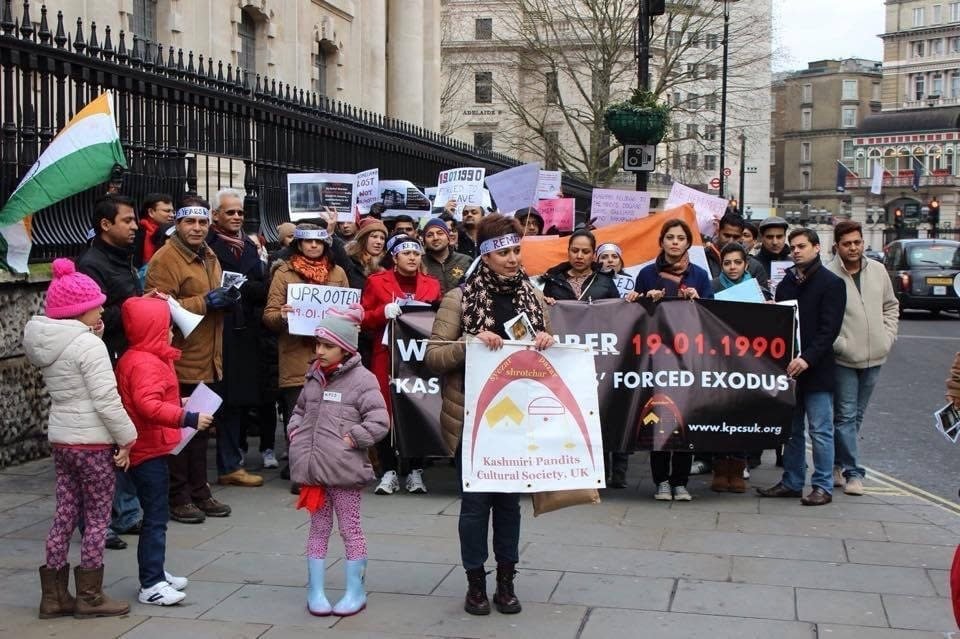Having Opened “The Kashmir Files”: What Must Happen Next?


Opened on 11 March 2022, The Kashmir Files shocked the world. The glaring truth of Hindu Genocide in Kashmir at the hands of Islamic Jehad, was acknowledged on the silver screen for the first time. Backing this were the many testimonies of survivors of this Genocide, the Kashmiri Pandits all over the world. Blood and gore was not romanticised but presented in its brutal and stark honesty, backed by eyewitnesses and evidence.
Three months since the opening of The Kashmir Files, the acclaimed film makers of this film have been touring around India and the world, highlighting the importance of global recognition and acknowledgement of the #HinduGenocide in #Kashmir. The film that portrayed the reality of Kashmir valley in 1990 and beyond, till the Article 370 abrogation brings out myriad strands of the genocidal process and also alludes to the Denial of Genocide by State and the ecosystem.
On 25 May 2022, Yasin Malik, separatist leader and the Chairman of the Jammu Kashmir Liberation Front (JKLF) in India, was produced by National Investigation Agency (NIA) before a Delhi court, where he was given life sentence in terror funding case. Special Judge Praveen Singh awarded varying jail terms to the convicted for offences under the stringent anti-terror law, Unlawful Activities Prevention Act (UAPA) and the IPC, rejecting the NIA’s plea for capital death punishment.
Arguably, justice seemed to be delivered in the public eye that was almost blood thirsty of the two terrorists shown in the film, who despite their own confession to their genocidal crimes roamed freely on Indian land, rubbing shoulders with the power centres in Delhi. Public uproar for justice needed a quick remedy and an optical illusion, hence the life sentence was delivered.
Those jubilant over this moral victory, I urge you to pause and understand what exactly must have been the course of action as Next Steps in justice delivery:
1. Official Recognition of ‘Genocide of Hindus’ in Kashmir. This actually means that by a motion passed in Indian Parliament, there should have been an official parliamentary recognition of ‘Hindu Genocide’ in Kashmir valley. This would then make way for legal processes to be implemented to punish these heinous crimes as not just murders, or anti terror activities but actually as ‘Genocide’.
2. Enactment of Genocide Crime and Atrocities Prevention Act in India. Whilst it may seem fashionable to make headline statements by seeking a place on the UN Security Council, it is first and foremost important to address issues closer home where a long pending commitment to international law remains unaddressed in Indian Parliament – the enactment of genocide crime and atrocities prevention bill to be formed as an Act of Indian government. I have written in detail about this in one of my earlier opinion pieces:
3. Genocidal trials. Once recognised and enacted in law, the perpetrators and participants of genocide must be tried and punished. As a case in example, for reference purposes, once the Rwandan genocide was recognised, a significant number of perpetrators of the genocide, including former high-level government officials and other key figures behind the massacres, have been brought to justice. The majority have been tried in Rwandan courts. Others have gone before the International Criminal Tribunal for Rwanda (ICTR) or domestic courts in Europe and North America. Similarly, in the case of Kashmiri Pandits’ Genocide, there must be trials conducted to punish perpetrators of genocidal crimes and those who were complicit in it.
Instead of the above three clear steps what is happening is white washing of justice delivery and dilution of the genocidal crimes.
As a Hindu from Kashmir, every one who delays the actual justice delivery and tampers with official recognition of ‘Genocide’ has the blood of my community members who were martyred in Kashmir valley and those who perished in the camps and in the pursuit to save their honour and lives.
The cost of genocide in monetary terms would run into several billion dollars and the civilisational price is being paid by the blood of hindus and other persecuted minorities, every day that justice is delayed.
DISCLAIMER: The author is solely responsible for the views expressed in this article. The author carries the responsibility for citing and/or licensing of images utilized within the text.
